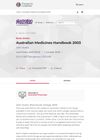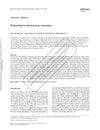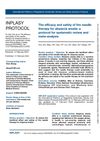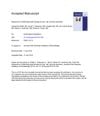 2 citations,
October 2003 in “Australian Prescriber”
2 citations,
October 2003 in “Australian Prescriber” The 2003 Australian Medicines Handbook was a clear, concise drug reference guide, updated with new topics and evidence, and considered essential for medical practice.
 October 2024 in “Cochrane library”
October 2024 in “Cochrane library” No high-certainty evidence supports any specific acne treatment.
 237 citations,
January 2010 in “The Journal of Sexual Medicine”
237 citations,
January 2010 in “The Journal of Sexual Medicine” The report recommends personalized treatment for women's sexual dysfunctions and more research on effective therapies.
 13 citations,
April 2017 in “Journal of Alternative and Complementary Medicine”
13 citations,
April 2017 in “Journal of Alternative and Complementary Medicine” Traditional and complementary medicine may help with skin conditions, but more high-quality research is needed.
 10 citations,
January 2018 in “Seminars in Reproductive Medicine”
10 citations,
January 2018 in “Seminars in Reproductive Medicine” The document concludes that women with PCOS need a comprehensive care model that covers reproductive, metabolic, and psychological health to improve their quality of life.
 December 2023 in “Journal of family medicine and primary care”
December 2023 in “Journal of family medicine and primary care” Hair loss in Saudi Arabia causes a low psychosocial impact, with less effect on those without a family history of hair loss.
 21 citations,
July 2018 in “The Journal of Sexual Medicine”
21 citations,
July 2018 in “The Journal of Sexual Medicine” The 2018 update to the ED care model added a new severity score and stressed a detailed evaluation of both physical and psychological aspects.
 4 citations,
August 2021 in “Clinical and Experimental Reproductive Medicine”
4 citations,
August 2021 in “Clinical and Experimental Reproductive Medicine” The 2018 guideline for PCOS suggests new diagnostic criteria and treatments, but recognizes the need for more research.
 3 citations,
February 2018 in “InTech eBooks”
3 citations,
February 2018 in “InTech eBooks” Traditional Chinese Medicine and acupuncture may improve Polycystic Ovarian Syndrome symptoms and reduce costs, but more research is needed.
 1 citations,
January 2020 in “Elsevier eBooks”
1 citations,
January 2020 in “Elsevier eBooks” Forensic medicine is crucial for justice and needs continuous innovation and technology integration.
 1 citations,
May 2017 in “InTech eBooks”
1 citations,
May 2017 in “InTech eBooks” Some natural remedies may help with hair regrowth, but more research is needed to confirm their effectiveness and safety.
 926 citations,
June 2010 in “BMC Medicine”
926 citations,
June 2010 in “BMC Medicine” Polycystic ovary syndrome is a complex condition that affects women's mental, reproductive, and metabolic health throughout their lives.
 3 citations,
July 2012 in “British journal of hospital medicine”
3 citations,
July 2012 in “British journal of hospital medicine” The guide helps clinicians diagnose and manage hair loss, detailing examination techniques and treatments for different types of alopecia.
 13 citations,
January 2021 in “RSC chemical biology”
13 citations,
January 2021 in “RSC chemical biology” Wnt activation shows promise for regenerative medicine but requires selective targeting to minimize risks like cancer.
 10 citations,
February 2010 in “Journal of Dermatological Treatment”
10 citations,
February 2010 in “Journal of Dermatological Treatment” Podcasting could improve dermatology education if it had more consistent, evidence-based content and better regulation.
 5 citations,
September 2021 in “Southern African Journal of Hiv Medicine”
5 citations,
September 2021 in “Southern African Journal of Hiv Medicine” The guideline provides healthcare professionals in South Africa with instructions for comprehensive, multidisciplinary gender-affirming care, including HIV prevention and treatment for transgender and gender diverse individuals.
 67 citations,
February 2015 in “Life Sciences”
67 citations,
February 2015 in “Life Sciences” Some plant-based treatments can help with benign prostatic hyperplasia symptoms, but more research is needed to confirm their safety and effectiveness.
 20 citations,
January 2022 in “Polymers”
20 citations,
January 2022 in “Polymers” Nanoparticles added to natural materials like cellulose and collagen can improve cell growth and wound healing, but more testing is needed to ensure they're safe and effective.
 37 citations,
December 2019 in “Giornale italiano di dermatologia e venereologia”
37 citations,
December 2019 in “Giornale italiano di dermatologia e venereologia” The Italian guidelines offer advice for diagnosing and treating alopecia areata based on expert opinion and limited clinical trial evidence.
 3 citations,
April 2011 in “Expert Review of Dermatology”
3 citations,
April 2011 in “Expert Review of Dermatology” Mesotherapy lacks strong evidence for effectiveness and safety, and its ingredients are not FDA-approved for subcutaneous use.
 37 citations,
May 2016 in “Deutsches Arzteblatt International”
37 citations,
May 2016 in “Deutsches Arzteblatt International” Hair loss requires customized treatments based on its various causes and types.
August 2024 in “Cosmetics” Personalized treatments for hair loss are becoming more effective by using genetic information.

PRP is promising for skin, hair, and wound treatments but needs standardized methods and more research.

Fire needle therapy's benefits and safety for alopecia areata need more evidence.
 4 citations,
August 2018 in “Journal of The American Academy of Dermatology”
4 citations,
August 2018 in “Journal of The American Academy of Dermatology” The authors agree that biotin may help certain hair disorders but lacks evidence for use in healthy people and call for more research.
 1 citations,
October 2018 in “InTech eBooks”
1 citations,
October 2018 in “InTech eBooks” The document concludes that treatments for cicatricial alopecia are not well-supported by evidence, but hair transplantation shows more predictable and satisfactory results.
 1 citations,
May 2015 in “Primary Health Care”
1 citations,
May 2015 in “Primary Health Care” Effective acne treatment varies by type, with topical and oral medications showing strong evidence, and patient education and support are crucial.
 February 2025 in “Healthcare”
February 2025 in “Healthcare” Caffeine may help with hair loss, but more research is needed.
 July 2011 in “Springer eBooks”
July 2011 in “Springer eBooks” The document concluded that FDA-approved treatments like minoxidil and finasteride are effective for hair loss, while the effectiveness of natural remedies and other non-approved treatments is not well-supported by evidence.
 21 citations,
May 2021 in “Patient education and counseling”
21 citations,
May 2021 in “Patient education and counseling” Managing PCOS is hard because it varies a lot, treatments are limited, and there's a lot of false information online.





























